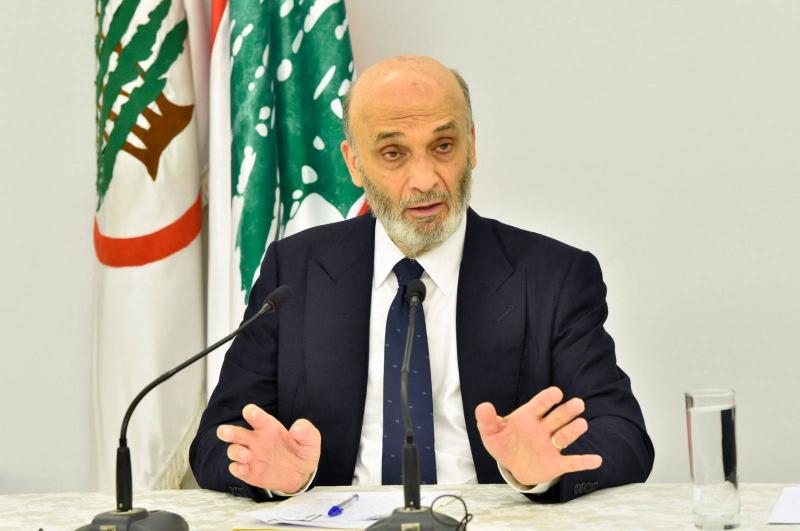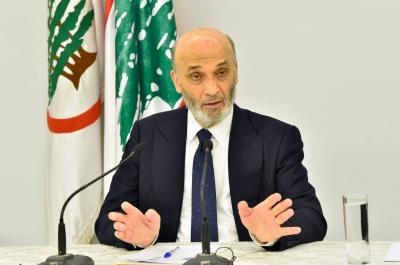Samir Geagea, the head of the Lebanese Forces party, stated that "the cause of the tragic situation is the unholy alliance between the resistance axis and the Free Patriotic Movement." He added during a press conference in Maarab: "The government in Lebanon operates from a clientelist spirit more than from revenues and reaches out to the Central Bank to fill the deficit." He pointed out that "our main problem in recent years is the irregular functioning of institutions," noting that "paying salaries is the responsibility of the government, not the Central Bank."
Geagea also addressed the appointment of Wassim Mansouri as the acting governor of the Central Bank after Riad Salameh's term ended, praising the sound principles launched at the meeting of the four MPs, which opened new horizons, hoping they would insist on their positions and not back down under political pressure, as it represents the first stone in the path of a thousand miles.
He continued: "They decided to follow this policy, which is good, except for the request to approve a law from the Parliament that allows the government to borrow from the Central Bank for a short period, on the condition of repayment. Although I believe this law will not pass due to the opposition of many blocs and MPs, this does not mean I do not understand this matter, but I do not support it, as this is not the task of the already drained Central Bank. How many times has the government borrowed from the latter in recent years without repaying the debt?"
Regarding taxes, Geagea revealed that "more than one billion dollars are wasted annually from uncollected taxes, and 'the smuggling continues' in customs, and there is potential to collect one billion dollars there." He expressed regret over the ongoing closure of the real estate and mechanics departments instead of holding the corrupt accountable and restoring normal operations.
Reiterating that he would not direct any call to the inherently hopeless resistance axis that speaks of imaginary victories while the people are starving, Geagea noted that there are several good ministers in this government, but its core is from the resistance axis and its allies.
In response to a question about the consultative meeting in Diman and the replacement of political Christian leadership with religious leadership, he replied: "We should not give matters more dimensions than they are. Prime Minister Najib Mikati wanted to take this step to respond to those who accused him of attempting to undermine Christian positions. 'No one can replace anyone with anything, nor can the Patriarch's cover be accepted.'"
Regarding Mansouri's ability to maintain his decisions, especially since he and the Minister of Finance belong to the same reference, he stated: "I do not look at anyone's political background, but rather at their work. The statements coming from Mansouri are good, and the first step is sound, but if it is not followed up, 'there is no power or strength,' but regardless of his political reference, the proposals he and his deputies have put forward are sound so far."
On the presidential file, he remarked: "What the Forces are doing with the opposition as a whole is to cut off the road for the resistance candidate so that we do not prolong the current tragic situation with further deterioration, aiming to elect a president who can succeed in improving the situation, even if only slightly. I do not expect anything until the resistance axis changes its stance represented by its commitment to Sleiman Frangieh. As for dialogue, what should we dialogue about? Knowing that communication channels are open."
Finally, he considered that "the state has enough resources to secure the amounts required of it, such as salaries and others, which it tries to 'suck out' from the Central Bank or from the pockets of the people. The current government, like its predecessors, can collect about 3 billion dollars, but unfortunately, it goes to waste." He attributed this waste to "three reasons:
- Tax evasion that is applied selectively, costing the state one billion dollars through the tax law applied to some big merchants, who are well-known and have branches all over Lebanon.
- Customs smuggling at the port, airport, and legitimate crossings, amounting to nearly one billion dollars due to known 'smuggling' groups.
- Smuggling from Syria to Lebanon which costs the state 250 million dollars, after it was the opposite during the support period. For instance, the smuggling of Iranian fuels into Lebanon that enters through illegal crossings without paying fees and is sold at a cheaper price, as well as the entry of 'privileged' traders, who have connections with the resistance axis, smuggling goods illegally from Tartous and Latakia, preventing the state from collecting additional revenues, not to mention the significant losses from illegal networking."




